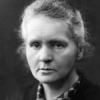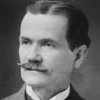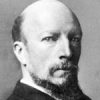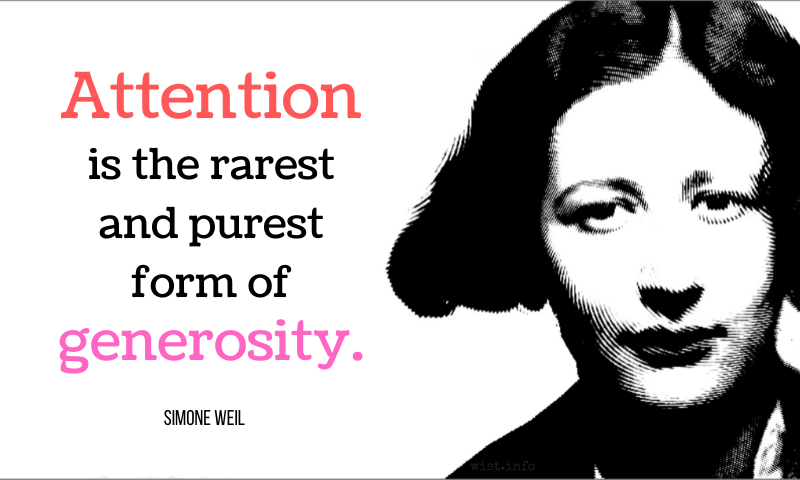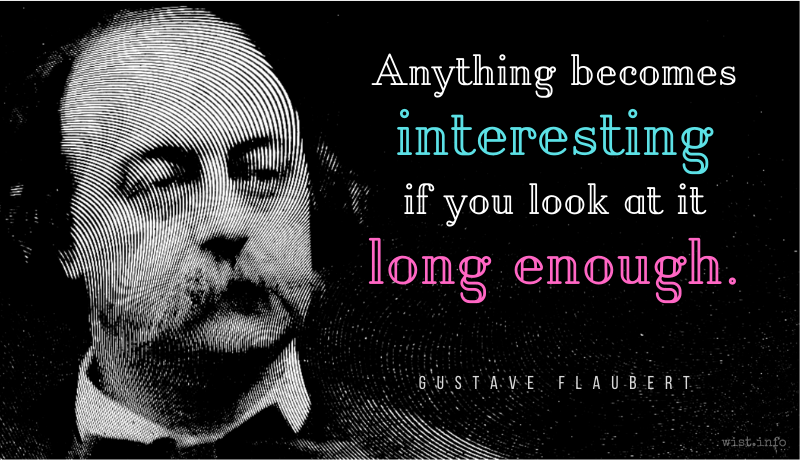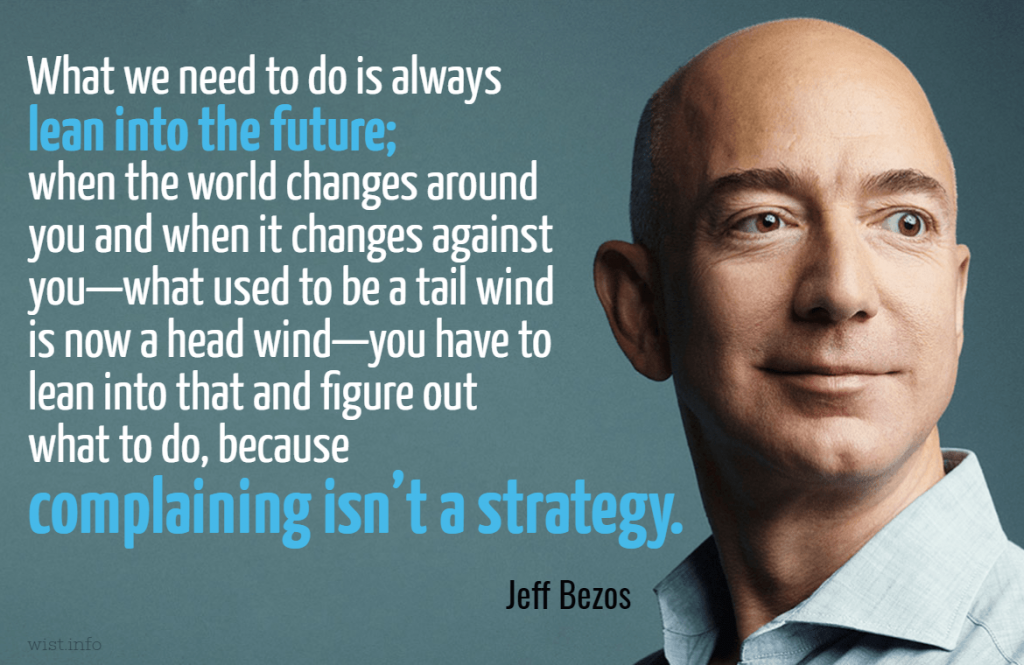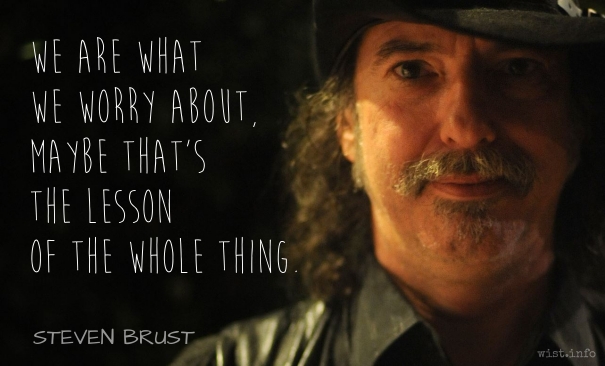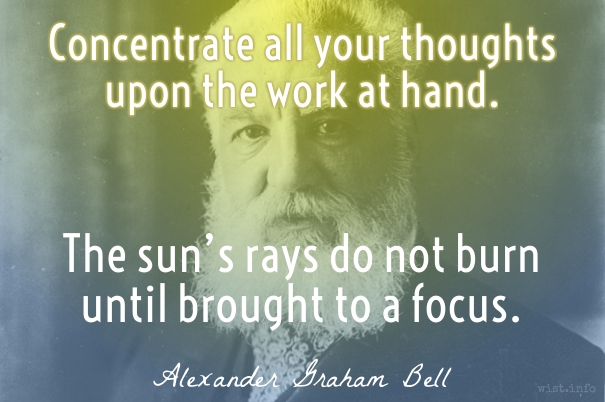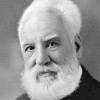Sex gives us a glimpse of a concentration of the mind that would make us godlike if we could command it in other spheres.
Colin Wilson (1931-2013) English existentialist philosopher, novelist
The God of the Labyrinth [The Hedonists] (1970)
(Source)
Quotations about:
focus
Note not all quotations have been tagged, so Search may find additional quotes on this topic.
Never get a reputation for a small perfection, if you are trying for fame in a loftier area; the world can only judge by generals, and it sees that those who pay considerable attention to minutiæ, seldom have their minds occupied with great things. There are, it is true, exceptions; but to exceptions the world does not attend.
Edward George Bulwer-Lytton (1803-1873) English novelist and politician
The Disowned, ch. 2 [Talbot] (1828)
(Source)
See La Rochefoucauld.
When we are working at a difficult task and strive after a good thing we fight a righteous battle, the direct reward of which is that we are kept from much evil.
The concentration of a small child at play is analogous to the concentration of the artist of any discipline. In real play, which is real concentration, the child is not only outside time, he is outside himself. He has thrown himself completely into whatever it is that he is doing. A child playing a game, building a sand castle, painting a picture, is completely in what he is doing. His self-consciousness is gone; his consciousness is wholly focused outside himself.
Anyone who has achieved excellence in any form knows that it comes as a result of ceaseless concentration. Paying attention.
Louise "Lulu" Brooks (1906-1985) American film actress, dancer, writer
Lulu in Hollywood, ch. 5 “The Other Face of W. C. Fields” (1982)
(Source)
Writing of Mack Sennett.
We must try to keep the mind in tranquility. For just as the eye which constantly shifts its gaze, now turning to the right or to the left, now incessantly peering up and down, cannot see distinctly what lies before it, but the sight must be fixed firmly on the object in view if one would make his vision of it clear, so too man’s mind when distracted by his countless worldly cares cannot focus itself distinctly on the truth.
Basil of Caesarea (AD 330-378) Christian bishop, theologian, monasticist, Doctor of the Church [Saint Basil the Great, Ἅγιος Βασίλειος ὁ Μέγας]
Letter to Gregory of Nazianzus (c. AD 358) [tr. Defarrari (1926)]
(Source)
If I wanted to write, I had to be willing to develop a kind of concentration found mostly in people awaiting execution.
People who are too much concerned with little things usually become incapable of big ones.
[Ceux qui s’appliquent trop aux petites choses deviennent ordinairement incapables des grandes.]François VI, duc de La Rochefoucauld (1613-1680) French epigrammatist, memoirist, noble
Réflexions ou sentences et maximes morales [Reflections; or Sentences and Moral Maxims], ¶41 (1665-1678) [tr. Kronenberger (1959)]
(Source)
Present from the 1665 edition. See here for more discussion (English).
(Source (French)). Alternate translations:
They that use to employ their minds too much upon Trifles, commonly make themselves incapable of any thing that is serious or great.
[tr. Stanhope (1694), ¶42]
Those who apply themselves too much to little things, commonly become incapable of great ones.
[pub. Donaldson (1783), ¶38; ed. Lepoittevin-Lacroix (1797), ¶41]]
Those who apply themselves much to little things, commonly become incapable of great ones.
[ed. Carville (1835), ¶35]
Those who bestow too much application on trifling things, become generally incapable of great ones.
[ed. Gowens (1851), ¶42]
Those who apply themselves too closely to little things often become incapable of great things.
[tr. Bund/Friswell (1871)]
Undue attention to details tends to unfit us for greater enterprises.
[tr. Heard (1917)]
Too close attention to trifles generally breeds incapacity in matters of moment.
[tr. Stevens (1939)]
Men too involved in details usually become unable to deal with great matters.
[tr. FitzGibbon (1957)]
People too much taken up with little things usually become incapable of big ones.
[tr. Tancock (1959)]
Those who apply themselves too much to little things, ordinarily become incapable of great ones.
[tr. Whichello (2016)]
Everybody knows if you are too careful you are so occupied in being careful that you are sure to stumble over something.
Gertrude Stein (1874-1946) American expatriate author, feminist
Everybody’s Autobiography, ch. 1 (1937)
(Source)
Well, it’s no trick to make a lot of money — if all you want to do is make a lot of money.
Joseph Mankiewicz (1909-1993) American screenwriter, director, producer
Citizen Kane [Mr. Bernstein] (1941) [with Orson Welles]
(Source)
Old Age is not so fiery as Youth; but when once provoked cannot be appeased.
Thomas Fuller (1654-1734) English physician, preacher, aphorist, writer
Gnomologia: Adages and Proverbs, #3704 (1732)
(Source)
But why speak of others? Let me now return to myself.
[Sed quid ego alios? Ad me ipsum iam revertar.]
Marcus Tullius Cicero (106-43 BC) Roman orator, statesman, philosopher
De Senectute [Cato Maior; On Old Age], ch. 13 / sec. 45 (13.45) (44 BC) [tr. Falconer (1923)]
(Source)
(Source (Latin)). Alternate translations:
But it is not nede also to remembre in what thynges the othir olde men tokyn their honeste delectacyons. Therfor I shall come ayen to speke of myself.
[tr. Worcester/Worcester/Scrope (1481)]
But wherefore speak I so much of others? I will now returne to my selfe.
[tr. Austin (1648)]
But what have I to do with others, let me return now to myself.
[tr. J. D. (1744)]
But why should I quote others, and not rather return and speak of myself?
[tr. Logan (1744)]
But to pass from the practice of others to my own ....
[tr. Melmoth (1773)]
But why do I mention others? I will now return to myself.
[Cornish Bros. ed. (1847)]
But why do I refer to others? let me now return to myself.
[tr. Edmonds (1874)]
But why am I talking about others? I now return to my own case.
[tr. Peabody (1884)]
But why mention others? I will come back to my own case.
[tr. Shuckburgh (1895)]
Why speak of these?
Let's take myself.
[tr. Allison (1916)]
But enough of others -- let me return to myself!
[tr. Grant (1960, 1971 ed.)]
But why speak of other men? Let me revert to my own case.
[tr. Copley (1967)]
Enough of other people. Let me speak now of my own experience.
[tr. Cobbold (2012)]
But again I don't have to talk about the world famous. I can provide personal examples.
[tr. Gerberding (2014)]
I’ll now revert only to myself,
And put all the others on the shelf.
[tr. Bozzi (2015)]
For always the man in whom thought springs up over thought sets his mark farther off, for the one thought saps the force of the other.
[Ché sempre l’omo in cui pensier rampolla
sovra pensier, da sé dilunga il segno,
perché la foga l’un de l’altro insolla]Dante Alighieri (1265-1321) Italian poet
The Divine Comedy [Divina Commedia], Book 2 “Purgatorio,” Canto 5, l. 16ff (5.16-18) (1314) [tr. Sinclair (1939)]
(Source)
Virgil telling Dante he's overthinking things, letting himself be distracted.
(Source (Italian)). Alternate translations:
He, that permits his Fancy thus to stray.
With every lure, will rarely find his way
To that great end, to which his soul is bent:
For gath'ring fancies warp the steady light
Of Reason's beam, and leave her whelm'd in night,
For ever baffled of her first intent.
[tr. Boyd (1802), st. 3]
He, in whose bosom thought on thought shoots out,
Still of his aim is wide, in that the one
Sicklies and wastes to nought the other’s strength.
[tr. Cary (1814)]
He in whose bosom thought springs up to thought,
Destroys himself the figures of his loom --
The birth of one prepares the others's tomb.
[tr. Bannerman (1850)]
For evermore the man in whom is springing
Thought upon thought, removes from him the mark,
Because the force of one the other weakens.
[tr. Longfellow (1867)]
For ever the man, in whom thought wells up over thought, removes far from himself his mark, because the rush of the second slackens the first.
[tr. Butler (1885)]
Always the man in whom new thought doth grow
On previous thought, from his true course doth roam,
Because the one doth flag the other's glow.
[tr. Minchin (1885)]
For always the man in whom thought on thought wells up removes from himself his aim, for the force of one weakens the other.
[tr. Norton (1892)]
For ever the man in whom thought wells up on thought, sets back his mark, because the one saps the force of the other.
[tr. Okey (1901)]
For always he in whom thought overtakes
The former thought, his goal less clearly sees.
Because the one the other must relax.
[tr. Binyon (1943)]
He aims beside the mark whose fancies bubble
One on another, driving back and drumming
Each other out, so that his eye sees double.
[tr. Sayers (1955)]
For when a man lets his attention range
toward every wisp, he loses true direction,
sapping his mind's force with continual change.
[tr. Ciardi (1961)]
For always the man in whom thought wells
up on thought sets back his mark,
for one thought weakens the force of the other.
[tr. Singleton (1973)]
The man who lets his thoughts be turned aside
by one thing or another, will lose sight
of his true goal, his mind sapped of its strength.
[tr. Musa (1981)]
Because the man in whom thoughts bubble up
One after the other, goes wide of the mark,
Because one thought weakens the force of another.
[tr. Sisson (1981)]
The man in whom thought thrusts ahead of thought
allows the goal he’s set to move far off --
the force of one thought saps the other’s force.
[tr. Mandelbaum (1982)]
For always the man in whom one care sprouts above the other makes his target more distant, because the impulse of the one weakens the other.
[tr. Durling (2003)]
Since the man, in whom thought rises on thought, sets himself back, because the force of the one weakens the other.
[tr. Kline (2002)]
When thought is bred too rampantly from thought,
then, of himself, a man will miss the mark.
Each mental thrust debilitates the first.
[tr. Kirkpatrick (2007)]
For any man who lets one thought --
and then another -- take him over
will soon lose track of his first goal.
[tr. Hollander/Hollander (2007)]
A man whose mind is distracted lets thought after thought
Keep him from getting where he wants to go:
They hammer each other down; nothing can grow.
[tr. Raffel (2010)]
One never notices what has been done; one can only see what remains to be done.
Marie Curie (1867-1934) Polish-French physicist and chemist [b. Maria Salomea Skłodowska]
Letter to her brother Joseph (1894-03-18)
(Source)
As quoted in Eve Curie Labouisse, Madame Curie: A Biography, ch. 9 (1937) [tr. Sheean (1938)].
Parents are often so busy with the physical rearing of children that they miss the glory of parenthood, just as the grandeur of trees is lost when raking leaves.
Marcelene Cox (1900-1998) American writer, columnist, aphorist
“Ask Any Woman” column, Ladies’ Home Journal (1945-05)
(Source)
I feel that art has something to do with the achievement of stillness in the midst of chaos. A stillness that characterizes prayer, too, and the eye of the storm. I think that art has something to do with an arrest of attention in the midst of distraction.
Love is the silent saying and saying of a single name.
Mignon McLaughlin (1913-1983) American journalist and author
The Neurotic’s Notebook, ch. 1 (1963)
(Source)
If you keep your eyes so fixed on Heaven that you never look at the Earth, you will stumble into Hell.
Austin O'Malley (1858-1932) American ophthalmologist, professor of literature, aphorist
Keystones of Thought (1914)
(Source)
The terrible events of life are great eye-openers. They force us to learn that which it is wholesome for us to know, but which habitually we try to ignore — namely, that really we have no claim on a long life; that we are each of us liable to be called off at any moment, and that the main point is not how long we live, but with what meaning we fill the short allotted span — for short it is at best.
Felix Adler (1851-1933) German-American educator
Life and Destiny, Lecture 8 “Suffering and Consolation” (1903)
(Source)
Animals never spend time dividing experience into little bits and speculating about all the bits they’ve missed. The whole panoply of the universe has been neatly expressed to them as things to (a) mate with, (b) eat, (c) run away from, and (d) rocks. This frees the mind from unnecessary thoughts and gives it a cutting edge where it matters.
Terry Pratchett (1948-2015) English author
Equal Rites (1987)
(Source)
Frequently paraphrased:
The entire universe has been neatly divided into things to (a) mate with, (b) eat, (c) run away from, and (d) rocks.
It is written that the last enemy to be vanquished is death. We should begin early in life to vanquish this enemy by obliterating every trace of the fear of death from our minds. Then can we turn to life and fill the whole horizon of our souls with it, turn with added zest to all the serious tasks which it imposes and to the pure delights which here and there it affords.
Felix Adler (1851-1933) German-American educator
Life and Destiny, Lecture 8 “Suffering and Consolation” (1903)
(Source)
As turning the logs will make a dull fire burn, so change of studies a dull brain.
Fantasy is my favorite genre for reading and writing. We have more options than anyone else, and the best props and special effects. That means if you want to write a fantasy story with Norse gods, sentient robots, and telepathic dinosaurs, you can do just that. Want to throw in a vampire and a lesbian unicorn while you’re at it? Go ahead. Nothing’s off limits. But the endless possibility of the genre is a trap. It’s easy to get distracted by the glittering props available to you and forget what you’re supposed to be doing: telling a good story. Don’t get me wrong, magic is cool. But a nervous mother singing to her child at night while something moves quietly through the dark outside her house? That’s a story. Handled properly, it’s more dramatic than any apocalypse or goblin army could ever be.
Patrick Rothfuss (b. 1973) American author
“Exploring the Edge of the Fantasy Map,” interview by Paul Goat Allen, Publisher’s Weekly (31 Jan 2011)
(Source)
No education is worth having that does not teach the lesson of concentration on a task, however unattractive. These lessons, if not learnt early, will be learnt, if at all, with pain and grief in later life.
Cyril Connolly (1903-1974) English intellectual, literary critic and writer.
Enemies of Promise, Part 3, ch. 24 “Vale” (1938)
(Source)
Speaking as a personified Eton College, quoting one of the masters there.
Few bothersome things are important enough to bother with. It is folly to take to heart what you should turn your back on. Many things that were something are nothing if left alone, and others that were nothing turn into much because we pay attention to them.
[Pocas cosas de enfado se han de tomar de propósito, que sería empeñarse sin él. Es trocar los puntos tomar a pechos lo que se ha de echar a las espaldas. Muchas cosas que eran algo, dejándolas, fueron nada; y otras que eran nada, por haber hecho caso de ellas, fueron mucho.]Baltasar Gracián y Morales (1601-1658) Spanish Jesuit priest, writer, philosopher
The Art of Worldly Wisdom [Oráculo Manual y Arte de Prudencia], § 121 (1647) [tr. Maurer (1992)]
(Source)
(Source (Spanish)). Alternate translations:
Few of those things that occasion trouble, are to be minded: else we shall torment our selves much in vain. It's to act the clean contrary way, to lay that to heart, which we should throw behind our backs. Many things that were of some consequence, have signified nothing at all, because men troubled not themselves about them; and others which signified nothing, have become matters of importance, because of the value that was put upon them.
[Flesher ed. (1685)]
Troublesome things must not be taken too seriously if they can be avoided. It is preposterous to take to heart that which you should throw over your shoulders. Much that would be something has become nothing by being left alone and what was nothing has become of consequence by being made much of.
[tr. Jacobs (1892)]
To convert petty annoyances into matters of importance, is to become seriously involved in nothing. It is to miss the point, to carry on the chest what has been cast from the shoulders. Many things which were something, by being left alone became nothing; and others which were nothing, became much because messed into.
[tr. Fischer (1937)]
Many see the trees but not the forest, or bark up the wrong tree, speaking endlessly, reasoning uselessly, without getting to the heart of the matter. They go round and round, tiring themselves and us, and never get to what is important. This happens to people with confused minds who do not know how to clear away the brambles. They waste time and patience on what it would be better to leave alone, and later there is no time for what they left.
[Vanse muchos o por las ramas de un inútil discurrir, o por las hojas de una cansada verbosidad, sin topar con la sustancia del caso. Dan cien vueltas rodeando un punto, cansándose y cansando, y nunca llegan al centro de la importancia. Procede de entendimientos confusos, que no se saben desembarazar. Gastan el tiempo y la paciencia en lo que habían de dejar, y después no la hay para lo que dejaron.]
Baltasar Gracián y Morales (1601-1658) Spanish Jesuit priest, writer, philosopher
The Art of Worldly Wisdom [Oráculo Manual y Arte de Prudencia], § 136 (1647) [tr. Maurer (1992)]
(Source)
(Source (Spanish)). Alternate translations:
Many fetch a tedious compass of words, without ever coming to the knot of the business: they make a thousand turnings and windings, that tire themselves and others, without ever arriving at the point of importance. And that proceeds from the confusion of their understanding, which cannot clear it self. They lose time and patience in what ought to be let alone, and then they have no more to bestow upon what they have omitted.
[Flesher ed. (1685)]
Many lose their way either in the ramifications of useless discussion or in the brushwood of wearisome verbosity without ever realising the real matter at issue. They go over a single point a hundred times wearying themselves and others and yet never touch the all important centre of affairs. This comes from a confusion of mind from which they cannot extricate themselves. They waste time and patience on matters they should leave alone and cannot spare them afterwards for what they have left alone.
[tr. Jacobs (1892)]
Most roam around, in useless millings either about the edge, or in the scrub of a tiresome verbosity, without striking upon the substance of the matter, they make a hundred turns about a point, wearying themselves, and wearying others, yet never arriving at the centre of what is important,- it is the product of a scattered brain that does not know how to get itself together,- they spend time, and exhaust patience, over that which they should leave alone, and afterwards are short of both for what they did leave alone.
[tr. Fischer (1937)]
Every man knows there are evils in this world which need setting right. Every man has pretty definite ideas as what these evils are. But to most men one in particular stands out vividly. To some, in fact, this stands out with such startling vividness that they lose sight of other evils, or look upon them as the natural consequence of their own particular evil-in-chief.
Henry Hazlitt (1894-1993) American business and economics journalist
Thinking As A Science, ch. 1, opening words (1916)
(Source)
I feel more alive when I’m writing than I do at any other time — except when I’m making love. Two things when you forget time, when nothing exists except the moment — the moment of the writing, the moment of love. That perfect concentration is bliss.
The great wisdom traditions of the world all recognize that the main impediment to living a life of meaning is being self-absorbed.
Barbara Brown Taylor (b. 1951) American minister, academic, author
An Altar in the World, ch. 6 (2009)
(Source)
So everything that slows us down and forces patience, everything that sets us back into the slow circles of nature, is a help. Gardening is an instrument of grace.
May Sarton (1912-1995) Belgian-American poet, novelist, memoirist [pen name of Eleanore Marie Sarton]
Journal of a Solitude (1973)
(Source)
When vision fails
Direction is lost.When direction is lost
Purpose may be forgotten.When purpose is forgotten
Emotion rules alone.When emotion rules alone,
Destruction … destruction.
The selfish man believes that by closing his heart against his fellows, and centering in self every thought and feeling, he escapes much suffering. But his egotistical calculations are invariably defeated; for his contracted sympathies being all directed to one focus, he so aggravates the ills he endures, that he expends on self along more painful pity than the most enthusiastic philanthropist devotes to mankind.
Marguerite Gardiner, Countess of Blessington (1789-1849) Irish novelist [Lady Blessington, b. Margaret Power]
Desultory Thoughts and Reflections (1839)
(Source)
Nothing contributes so much to tranquilize the mind as a steady purpose, — a point on which the soul may fix its intellectual eye.
Mary Wollstonecraft (1759-1797) English social philosopher, feminist, writer
Frankenstein, Letter 1 (1818)
(Source)
More discussion of the history of this quotation: Nothing Contributes So Much To Tranquillize the Mind As a Steady Purpose,—a Point On Which the Soul May Fix Its Intellectual Eye – Quote Investigator
Violent desire for one thing blinds the soul to all others.
[αἱ περί τι σφοδραὶ ὀρέξεις τυφλοῦσιν εἰς τἆλλα τὴν ψυχήν.]
Democritus (c. 460 BC - c. 370 BC) Greek philosopher
Frag. 72 (Diels) [tr. Freeman (1948)]
(Source)
Diels citation "72. (58 N.) DEMOKRATES. 37." Freeman notes this as one of the Gnômae, from a collection called "Maxims of Democratês," but because Stobaeus quotes many of these as "Maxims of Democritus," they are generally attributed to the latter. Alternate translations:
- "Extreme desires about one thing blind the soul to others." [tr. @sententiq (2018)]
- "Violent desire for one thing blinds the soul to everything else." [Source]
A man is fit for neither business nor pleasure, who either cannot, or does not, command and direct his attenti0on to the present object, and, in some degree, banish for that time all other objects from his thoughts. If at a ball, a supper, or a party of pleasure, a man were to be solving, in his own mind, a problem in Euclid, he would be a very bad companion, and make a very poor figure in that company; or if, in studying a problem in his closet, he were to think of a minuet, I am apt to believe that he would make a very poor mathematician. There is time enough for everything in the course of the day, if you do but one thing at once; but there is not time enough in the year, if you will do two things at a time.
Lord Chesterfield (1694-1773) English statesman, wit [Philip Dormer Stanhope]
Letter to his son, #121 (14 Apr 1747)
(Source)
A set of beliefs is at once a way of seeing the world more clearly while, at the same time, foreclosing an alternative vision.
Lillian Rubin (1924-2014) American writer, professor, psychotherapist, sociologist
Intimate Strangers: Men and Women Together (1983)
(Source)
Section reprinted as "The Sexual Dilemma" in Roberta Satow, Gender and Social Life (2000).
To emphasize only the beautiful seems to me to be like a mathematical system that only concerns itself with positive numbers.
Clarity and perseverance are difficult in American society because the basis of capitalism is greed and dissatisfaction.
Natalie Goldberg (b. 1948) American author, teacher, speaker
Wild Mind: Living the Writer’s Life, ch. 42 (1990)
(Source)
Such as are your habitual thoughts, such also will be the character of your mind; for the soul becomes dyed with the color of its thoughts.
Marcus Aurelius (AD 121-180) Roman emperor (161-180), Stoic philosopher
Meditations, Book 5, #16
Alt. trans.:
- "Your mind will be like its habitual thoughts; for the soul becomes dyed with the color of its thoughts."
- "Whatever kind of impressions you receive most often, so too will be your mind, for the soul is dyed with the color of one's impressions." [tr. Needleman & Piazza (2008)]
- "Your manners will depend very much upon the quality of what you frequently think on; for the soul is as it were tinged with the color and complexion of thought." [tr. Collier (1887)]
The last clause is also frequently attributed to William Ralph Inge, who likely used it in an essay.
I feel my heart glow with an enthusiasm which elevates me to heaven, for nothing contributes so much to tranquillize the mind as a steady purpose — a point on which the soul may fix its intellectual eye.
The moment one gives close attention to anything, even a blade of grass, it becomes a mysterious, awesome, indescribably magnified world in itself.
Henry Miller (1891-1980) American novelist
Plexus, ch. 2 (1953)
(Source)
Sometimes misquoted as "magnificent world".
Concentration is the secret of strength in politics, in war, in trade, in short, in all management of human affairs.
Ralph Waldo Emerson (1803-1882) American essayist, lecturer, poet
“Power,” The Conduct of Life, ch. 2 (1860)
(Source)
Anything becomes interesting if you look at it long enough.
[Pour qu’une chose soit intéressante, il suffit de la regarder longtemps.]
Gustave Flaubert (1821-1880) French writer, novelist
Letter to Alfred Le Poittevin (16 Sep 1845)
(Source)
Alt. trans.: "To make something interesting, just look at it for a long time."
What we need to do is always lean into the future; when the world changes around you and when it changes against you — what used to be a tail wind is now a head wind — you have to lean into that and figure out what to do, because complaining isn’t a strategy.
Jeff Bezos (b. 1964) American business magnate, entrepreneur, investor
Interview, ABC News (25 Sep 2013)
(Source)
It’s amazing how much work you can get done in three days if you hold a blowtorch to each end of the candle.
A talent forms itself in solitude,
A character amid the stream of life.[Es bildet ein Talent sich in der Stille,
Sich ein Charakter in dem Strom der Welt.]Johann Wolfgang von Goethe (1749-1832) German poet, statesman, scientist
Torquato Tasso, Act 1, sc. 2, ll. 304-305 [Leonora] (1790) [tr. Ryder (1993)]
(Source)
(Source (German)). Alternate translations:
- "A talent doth in stillness form itself -- / A character on life's unquiet stream." [tr. Des Voeux (1827)]
- "Talents are nurtured best in solitude, -- / A character on life's tempestuous sea." [tr. Swanwick (1843)]
- "Man's talent ripens in tranquility, / His character in battling with the world." [tr. Cartwright (1861)]
- "A talent in tranquility is formed, / A character in the turbulence of affairs." [tr. Hamburger (20th C)]
- "Talent develops in quiet places, / Character in the full current of human life."
- Talents are best nurtured in solitude; / Character is best formed in the stormy billows of the world.
- "Genius is formed in quiet, / Character in the stream of human life."
Take a book, the poorest one written, but read it with the passion that it is the only book you will read — ultimately you will read everything out of it, that is, as much as there was in yourself, and you could never get more out of reading, even if you read the best of books.
Never, in peace or war, commit your virtue or your happiness to the future. Happy work is best done by the man who takes his long-term plans somewhat lightly and works from moment to moment “as to the Lord.” It is only our daily bread that we are encouraged to ask for. The present is the only time in which any duty can be done or any grace received.
On a recent Sunday evening, Theo came up with an aphorism: the bigger you think, the crappier it looks. Asked to explain he said, “When we go on about the big things, the political situation, global warming, world poverty, it all looks really terrible, with nothing getting better, nothing to look forward to. But when I think small, closer in — you know, a girl I’ve just met, or this song we’re going to do with Chas, or snowboarding next month, then it looks great. So this is going to be my motto — think small.”
I live my life in celebration and in praise of the life I’m living. What you focus on expands. The more you praise and celebrate your life, the more there is in life to celebrate. The more you complain, the more you find fault, the more misery and fault you will have to find.
Oprah Winfrey (b. 1954) American TV personality, actress
“Words of the Week,” Jet (27 Oct 1986)
(Source)
Concentrate all your thoughts upon the work at hand. The sun’s rays do not burn until brought to a focus.
Alexander Graham Bell (1847-1922) Scottish-American scientist, inventor, engineer
Interview, in Orison Swett Marden, How They Succeeded, ch. 2 (1901)
(Source)














